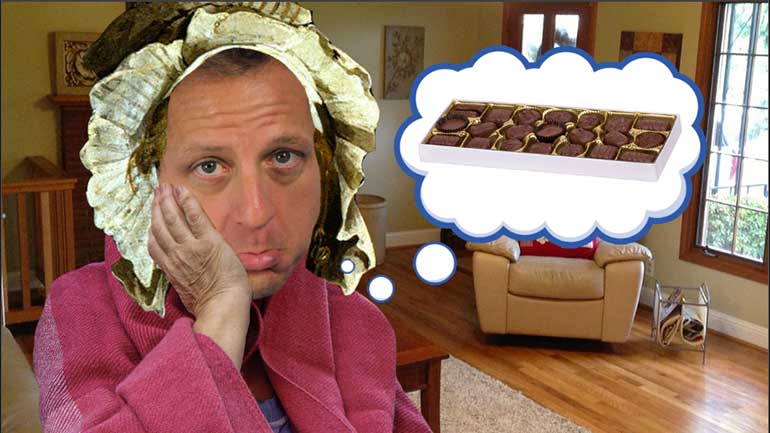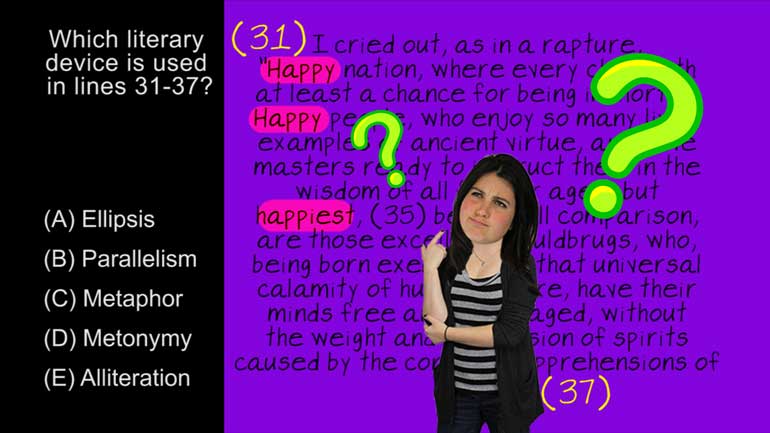ShmoopTube
Where Monty Python meets your 10th grade teacher.
Search Thousands of Shmoop Videos
Animal Farm 1.3: Thou Shalt Not Take George Orwell's Name in Vain 47 Views
Share It!
Transcript
- 00:04
Animal Farm 1.3 Thou Shalt Not Take… a la Shmoop.
- 00:09
More rules? Yep. Gotta have ’em. Unless you want to take your chances in a lawless dystopia.
- 00:14
And that might work for some people, but we don’t look that great in a leather jacket.
- 00:18
So rules it is. Animal Farm has Seven Commandments.
- 00:23
Who made them? Wasn’t this brand new society of equals not supposed to have rules?
Full Transcript
- 00:28
Oh… right. And after the rules were made, who kept changing them?
- 00:32
Enter the pigs… Who made the pigs the leaders of Animal Farm?
- 00:36
Genetics. You see, pigs are known to be very smart.
- 00:39
And that means they can outthink the other animals.
- 00:42
They make the rules because they can. The Seven Commandments were just the start.
- 00:47
But then the pigs made every decision that followed, like running the farm, building
- 00:51
the windmill, associating with humans, stealing the milk, sleeping in beds, and wearing clothes
- 00:57
– which required alterations to the Seven Commandments.
- 01:00
Stealing the milk foreshadowed the pigs’ stealing of the whole revolution.
- 01:05
Why did the other animals allow this sabotage? Yep, those pesky genetics again.
- 01:10
They just didn’t have the same smarts as the pigs.
- 01:13
They might have had uneasy feelings about this or that rule, but since they didn’t
- 01:17
have the brain power of the pigs, they couldn’t figure out why they had those feelings.
- 01:22
So they deferred all the leadership of their revolution to the pigs.
- 01:26
Of course, seeing what Napoleon’s dogs did to anyone who disagreed with him gave the
- 01:30
animals a huge incentive to be agreeable. Between the pigs’ brains and the dogs’ brawn,
- 01:35
the rest of the farm animals didn’t stand a chance.
- 01:38
When Boxer became confused, he repeated his mantra, “Napoleon is always right”.
- 01:44
It wasn’t that he wouldn’t challenge Napoleon…because – let’s face it - he certainly would have
- 01:49
won a boxing match with the pig…it was because he couldn’t challenge Napoleon.
- 01:54
He had the physical ability, but not the mental ability.
- 01:57
Mollie never got the picture at all.
- 01:59
Concerned with ribbons and sugar cubes,
- 02:00
she couldn’t grasp the basic concept that revolution meant no ribbons.
- 02:05
The sheep were the mindless masses who bleated
- 02:07
“Four legs good, two legs bad,” whenever it looked like Napoleon’s authority might
- 02:12
be questioned. They were plants for crowd control.
- 02:15
So does this mean that all revolutions are doomed to fail? Not necessarily. The American Revolution
- 02:20
worked out, produced a democratic country with some impressive leaders…
- 02:23
…like George Washington and Abraham Lincoln.
- 02:25
Unfortunately there was pretty much everyone else.
- 02:28
History has many examples of caring leaders… like Snowball/Trotsky could have been…
- 02:34
…if it weren’t for that ruthless, power-hungry Napoleon.
- 02:36
But uh, ….just to be safe…
Up Next
When you're about to marry the love of your life, not many things could stop you. However, finding out that your future hubby is keeping his crazy...
Related Videos
Here at Shmoop, we work for kids, not just the bottom line. Founded by David Siminoff and his wife Ellen Siminoff, Shmoop was originally conceived...
ACT Math: Elementary Algebra Drill 4, Problem 5. What is the solution to the problem shown?
AP® English Literature and Composition Passage Drill 1, Problem 1. Which literary device is used in lines 31 to 37?
AP® English Literature and Composition Passage Drill 2, Problem 1. What claim does Bacon make that contradicts the maxim "Whatsoever is delig...




